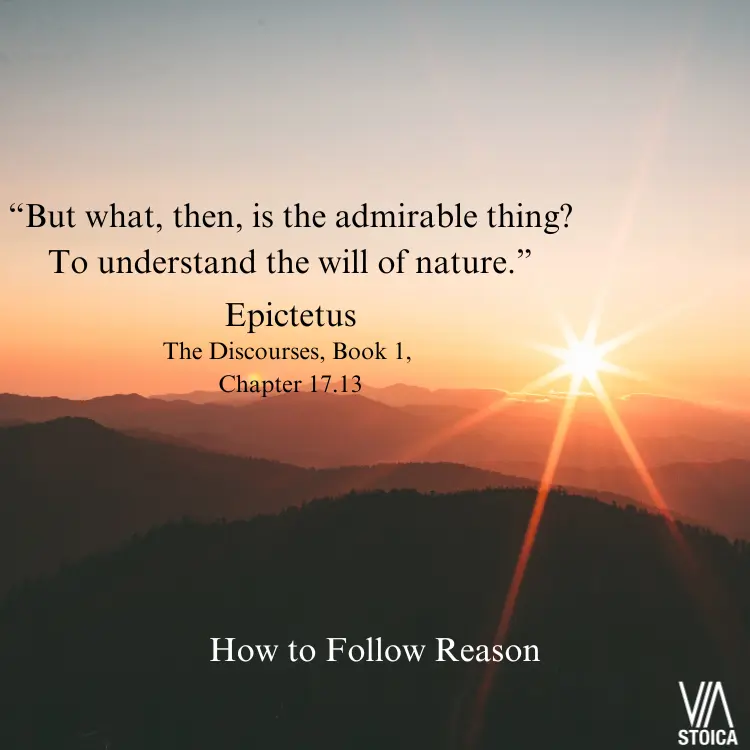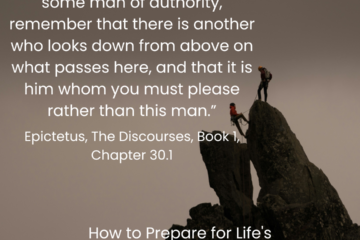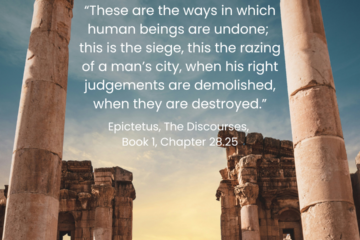
How do we follow reason? According to the Stoics, this is what god is, the Rational universe. And we have been given a part of it, of this logic. Yet when we look around us, we fail to use it most of the time. Arrian devotes a discourse to this question as he noted down in book 1, chapter 17; ‘That Logic is Indispensable’. Here we can read how Epictetus tells us the importance of reason, but also how we should apply it and who we should learn it from.
“Since it is reason that analyses and brings to completion all other things, reason itself should not be left unanalyzed.”
Epictetus, The Discourses, Book 1, Chapter 17.1
How can reason be analyzed? That is the question we start off with. Epictetus gives us the two options there are.
“Plainly, either by itself, or by something else.”
Epictetus, The Discourses, Book 1, Chapter 17.2
Reason and Logic are the Logos

If reason and logic are part of the logos, the divine, then what could there be above this to examine it? If there is nothing more out there, which is what the Stoics believe, then it must be able to examine itself. And let’s say that there is something more than reason, then this must be able to do so itself. But this cannot be an endless process. At one point there must be something that contains it all.
This brief introduction leads us to what we use reason for, which is the approval of right judgments. This is what the student asks Epictetus, to help him cure his judgments. To make sure we look at the world in the right way, we need to be able to distinguish between true and false. Yet, before we can go there, Epictetus reminds us what all philosophers must do first. We need to go to the first principles, the bare facts, and from there can we build our arguments and find the truth.
“The philosopher puts logic first, just as, when it comes to measuring grain, we begin by examining the measure.”
Epictetus, The Discourses, Book 1, Chapter 17.6
Unless we agree on the basic forms of measurement, we can’t start discussing the matter at hand. The same goes for logic. We must first understand what logic is. Epictetus, however, doesn’t delve too deep into this topic in this discourse. But he does mention the following.
The objective observer

“It is enough that logic has the power to distinguish and examine all other things, and as one may say, measure and weigh them.”
Epictetus, The Discourses, Book 1, Chapter 17.10
Reason and logic can then be seen as the objective observer who measures and weighs the events that happen. Without imposing any different views based on personal preferences or ego-driven wants, desires, and aversions. It looks at the events like a scale does at the weight. A kilo of sugar is that, a kilo. It isn’t a lot or too little, because those are judgments driven by the view of a person. Yet, if a recipe requires a certain amount to make the dough, then logic would be able to tell us whether we need more or less. But we must always start with the examination of the terms.
“But what, then, is the admirable thing? To understand the will of nature.”
Epictetus, The Discourses, Book 1, Chapter 17.13
The discourse takes a shift here, from looking at what reason is, to how to follow it. Or at least, who should teach us? To find the right teacher, we need the right interpreter of nature. Chrysippus was the person they would go to, or at least went to in Epicetus’s days. But what happens if you can’t understand Chrysippus, then should you go to an interpreter of him? Yet even understanding isn’t enough.
¨If he (Chrysippus) only interprets the will of nature, but does not follow it himself; how much less his interpreter.”
Epictetus, The Discourses, Book 1, Chapter 17.17
Applied Reason
It isn’t enough to understand what nature is, what words in a book say, or what wise people share. We need to apply it. The ones who can do that, are the real interpreters. These are the ones who set the right example and who we can learn from. Through them can we learn what nature is and in part reason and logic. As was Chrysippus someone who showed us what nature was and how to live in accordance with it, so can we.

To bring this discourse to conclusion we end up with our choice. The same with our opinions and actions, these are up to us. We must learn that no one can keep us from making these choices.
“‘But if a person inflicts the fear of death upon me’, someone says, ‘he compels me.’ No, it is not what is inflicted upon you that compels you, but your own judgment that it is better to do such and such a thing than to die. Here, again, you see it is your own judgment that compelled you – that is, choice compelled choice.”
Epictetus, The Discourses, Book 1, Chapter 17.25-26
How to follow reason
How to follow reason requires us to go to the basics, the first principles of what to measure and weigh the events that happen to us. That upon which we place a judgment of good or bad is a product of our view and choice. It is because we wish for a certain thing, that anything that impedes that becomes bad. The same with when it does happen, we judge it as good. But we must not worship the interpreter, but the interpretation itself. And for this, we must learn to go to the source, nature. Nature is pure logic and reason. Since we contain part of it, we also are able to examine nature itself like when we examine ourselves. Thus become an interpreter, but don´t pride yourself on this title, use it to learn how to follow reason.
If you find yourself struggling with this and would like some guidance, our Stoic coaching services can help you. We offer different kinds of coaching programs, which you can check out here.



0 Comments